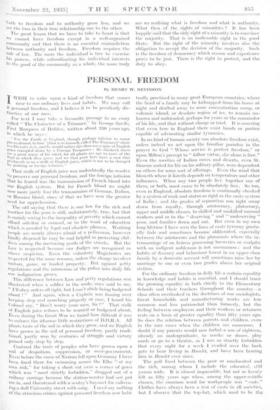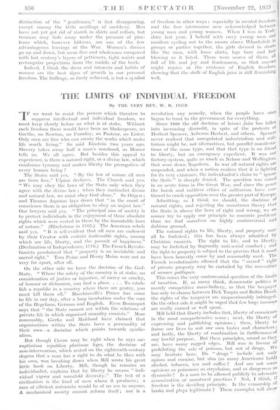PERSONAL FREEDOM
By HENRY W. NEVINSON
WISH to write upon a kind of freedom that comes near to our ordinary lives and habits. We may call it personal freedom, and I believe it to be peculiarly dis- tinctive Of our race.
For text I may take a favourite passage in an essay (Idled ". The Character of a Trimmer," by George Savile, l!irst Marquess of Halifax, written about 250 years ago, in which he saYs : ".For t he. Earth of England, though perhaps inferior to many Waves [11,4 ,ii I, to him" that is to himself, called The Trimmer] "there ia.a:bit it,ily in it. and lie would rather dye than see ;1 Spire of English grass t camphst down by a Foreign Trespasser : ]Be thinketh there t,,Ive a great many of his mind, for all plants am apt to taste of tho _ nnyi in which they grow, and wo that grow here have a root that ernclueeth in us a stalk of English juice, which is not to be changed ''13' grafting or foreign infusion." ' That stalk of English juice was undoubtedly the resolve to Preserve our personal freedom, and the foreign infusion that he feared was the transmission of French blood into Our English system. But for French blood we might rtaw more justly fear the transmission of German, Italian, or Russian blood, since of that we have now the greater -need for apprehension, . The old saying that there is one law for the rich and another for the poor is still, unfortunately, true, but that is mainly owing to the inequality of poverty which cannot afford solicitor or counsel, or to the want of education which is puzzled by legal and obsolete phrases. Working People arc nearly always afraid of a policeman, however kindly disposed he may be and helpful in protecting chil- dren among the increasing perils of the streets. But the Law is respected because our Judges are recognised as above suspicion. Even the voluntary Magistrates are respeeted for the same reasons, unless the charge involves motors, game, or landed property. But against petty regulations and the intrusions of the police into daily life our indignation grows. • This difference between Law and petty regulations was illustrated when a soldier in the ranks once said to Inc, " I'll obey orders all right, but I can't abide being badgered about.! " And again, when a Captain was fussing over keeping step and marching properly _at case, 1 heard his Colonel say, " Don't worry your men, Sir !" That stalk of English juice refuses to be worried or badgered about. Even during the Great War we found how difficult it was to enforce the irksome little restrictions of D.O.R.A. All Plants taste of the soil in which they grow, and we English have grown in the soil of personal freedom, partly tradi- tional, "partly won by centuries of struggle and victory gained only step by step. . Contrast the taste of peoples who have grown upon a c.)14. • of despotism, suppression, or over-government. Even before the curse of Nazism fell upon Germany I have been fined there for swimming across the Elbe " at my own risk," for taking .a short cut over a corner of grass "which was " most strictly forbidden," dragged out of a raihvay carriage because the statiori-inaster had not put :me in, and threatened with a sentry's bayonet for enliven- . inga dull TiI liycrsi t) street with song. I need say nothing of the atrocious crimes against personal freedom now habi- tually practised in many great European countries, where the head of a family may be kidnapped from his home at night and drafted away to some concentration camp, or volcanic island, or desolate region of ice, to remain un- known and unfriended, Perhaps-for years or the remainder of his life, and that without charge or trial. It is- amazing that even here in England there exist bands or parties capable of advocating similar tyrannies.
In no kind of human society can absolute freedom exist, unless indeed we act upon the familiar paradox in the prayer to God " Whose service is perfect freedom," or upon Milton's precept to " follow virtue, she alone is free." Even the ascetics of Indian eaves and deserts, even St. Simeon seated for life on his solitary pillar, were dependent on others for some sort of offerings. Even the wind that bloweth where it listeth depends on temperature and other influences. When any two people live together one of them, or both, must cease to be absolutely free. So too, even in England, absolute freedom is continually checked by a system of rank and status as rigid as the caste system of India ; and the grades of separation run right away down from royalty, through aristocracy, plutocracy, upper and middle classes, to skilled and unskilled manual workers and so to the " deserving " and " undeserving " poor, and families clown and out. But even in my own long lifetime I have seen the lines of caste tyranny gradu- ally fade and sometimes become obliterated, especially between the aristocrats and the plutocrats where the in- termarriage of an heiress possessing breweries or eoalpits with an indigent nobleman is not uncommon ; and the habits of decency and behaviour learnt in an upper-class family by a domestic servant will sometimes raise her by marriage to one or even two grades above her original station.
For the ordinary freedom in daily life a certain equality in knowledge and habits is essential, and I should trace the growing equality in both chiefly to the Elementary Schools and their teachers throughout the country—a class often overlooked in the doctrines of our sociologists. Great households and manufacturing works are less common and less patriarchal than formerly, but the feeling between employers and their workers or retainers rests on a basis of greater equality than fifty years ago. So does the relation between parents and children, even in the rare eases when the children are numerous. I doubt if any parents would now forbid a son of eighteen, already an undergraduate, to smoke or dance, play cards or go to a theatre, as I was so strictly forbidden that every night for a week I evaded over the back gate to hear Irving in Hamlet, and have been hearing him in Hamlet ever since.
The gulf fixed between the poor or uneducated and the rich, among whom I include the educated, still yawns wide. It is almost impassable, but not so keenly felt as fifty years ago when, among the upper-middle classes,• the common word for workpeople was " eada."
Clothes have always been a test of caste in all societies, • but I observe that the top-hat, which used to be the distinction of the " gentleman," is fast disappearing, except among the little nestlings of snobbery. Men have not yet got rid of starch in shirts and collars, but trousers may fade away under the pressure of plus- fours which, however hideous, are one of the few advantageous leavings of the War. Women's dresses go up and down, but seem free and wholesome compared with last century's layers of petticoats, tight waists and rectangular projections from the middle of the back.
Indeed, I think the dress and interests and habits of women are the best signs of growth in our personal freedom. The Suffrage, so finely achieved, is but a symbol of freedom in other ways : especially in mental freedom, and the free intercourse now acknowledged between young men and young women. When I was. in York' shire last year, I beheld with envy young. men and maidens cycling out to the moors above Wharfedale M groups or parties together, the girls dressed in shorts like the men, with loose shirts, legs bare and hay' blowing as it listed. .There were scores, of them, all full of life and joy and fearlessness, so that anyone might rejoice at the evidence of English freedom, showing that the stalk of English juice is still flourishing well.































































































 Previous page
Previous page